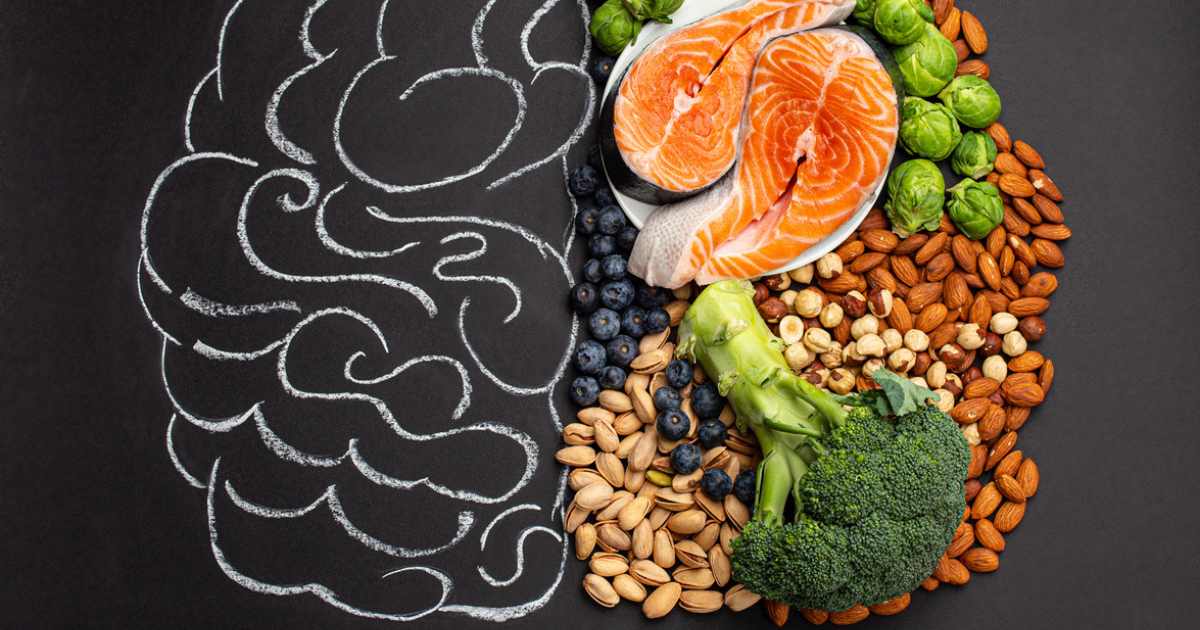
In memory care settings, the choices on one’s plate hold the power to shape cognitive well-being. Memory disorders present unique challenges, which can often affect memory and focus.
In this guide, we explore the connection between nutrition and memory care. We discuss the nutrients that fuel our brains, the impact of diet on brain function, and offer strategies to alleviate challenges faced by those with memory disorders.
The Connection Between Nutrition and Memory
Nutrition plays a pivotal role in brain development and maintaining brain health, particularly in the context of memory disorders. The brain is an energy-intensive organ, requiring various nutrients to function optimally. Understanding this connection can help in managing and potentially improving cognitive functions in individuals with memory impairments.
Essential Nutrients to Support Brain Health
- Omega-3 Fatty Acids: Found in fish, flaxseeds, and walnuts, omega fatty acids are vital for maintaining normal brain function and structure.
- Antioxidants: Vitamins C and E, found in fruits and vegetables, protect the brain from oxidative stress and inflammation.
- B Vitamins: Especially B6, B12, and folic acid, these vitamins are key in reducing homocysteine levels, which are linked to cognitive decline and Alzheimer’s disease.
- Iron and Zinc: These minerals, found in meats, seeds, and nuts, are crucial for neurotransmitter function and overall brain health. They also contribute to maintaining healthy blood flow to the brain.
How Diet Affects Cognitive Function
- Memory Enhancement: Diets rich in antioxidants and omega-3 fatty acids have been shown to enhance memory and cognitive functions.
- Mood Regulation: Nutrients like magnesium and vitamin D play a role in regulating mood and combating depression, which can accompany memory disorders.
- Neuroprotection: Certain foods can help protect brain cells from damage and reduce the risk of neurodegenerative diseases.
Brain-Gut Connection
Recent research suggests that there is a strong link between gut health and brain function. A healthy gut microbiome, fostered by a diet rich in fiber, probiotics, and prebiotics, can positively affect brain health and cognitive functions.

Nutritional Challenges in Memory Care
Individuals with memory disorders face unique nutritional challenges that can complicate their care and overall well-being. Recognizing and addressing these challenges is essential for maintaining health and quality of life in patients with conditions like Alzheimer's and other forms of dementia.
- Decreased Appetite and Weight Loss: Memory disorders often lead to reduced appetite and interest in food. This can be due to changes in taste, smell, or the ability to recognize hunger. Weight loss is a common concern, potentially leading to malnutrition and exacerbating cognitive decline.
- Difficulty in Chewing and Swallowing: As memory disorders progress, problems with motor skills can make chewing and swallowing difficult. This raises the risk of choking and aspiration, necessitating modifications in food texture and consistency.
- Forgetting to Eat or Drink: Short-term memory loss can result in forgetting to eat meals or drink fluids, leading to dehydration and malnutrition. Regular reminders and structured meal times are important in such cases.
- Medication Side Effects: Certain medications used in memory care can affect appetite and gastrointestinal health. Coordinating with healthcare providers to manage these side effects is crucial.
- Altered Food Preferences: Patients may develop new food preferences or aversions, often favoring sweet or strongly flavored foods. Balancing these preferences with nutritional needs is a key aspect of care.
- Physical and Cognitive Limitations: Physical limitations may hinder the ability to prepare meals, while cognitive impairments can lead to safety concerns in the kitchen. Assistance or supervision during meal preparation is often required.
- Emotional and Psychological Factors: Depression, anxiety, and social isolation, common in memory disorder patients, can further affect eating behaviors. Emotional support and a pleasant eating environment can help mitigate these issues.
Dietary Recommendations for Memory Enhancement
Proper nutrition can play a significant role in enhancing memory and cognitive function, especially in individuals with memory disorders. Here are key dietary recommendations that can help improve brain health and potentially boost memory:
- Focus on Brain Foods:
- Fatty Fish: Rich in omega-3 fatty acids, fish like salmon, trout, and sardines can improve brain function.
- Berries: Antioxidants in berries can delay brain aging and enhance memory function.
- Nuts and Seeds: These are good sources of antioxidants, healthy fats, and vitamins E and B, which are beneficial for brain health.
- Incorporate Whole Grains: Whole grains provide a steady supply of energy to the brain, enhancing concentration and cognitive function. Opt for brown rice, barley, bulgur wheat, and whole oats.
- Eat Leafy Green Vegetables: Vegetables like kale, broccoli, and spinach are full of brain-healthy nutrients like lutein, folate, vitamin K, and beta carotene.
- Include Healthy Fats: Healthy fats, especially monounsaturated fats found in olive oil, avocados, and nuts, support overall brain health.
- Stay Hydrated: Adequate hydration is crucial for maintaining cognitive function. Aim for regular intake of water, herbal teas, and other non-sugary, non-caffeinated beverages.
- Limit Intake of Refined Sugars or Processed Foods: High sugar consumption and processed foods can impair brain function and worsen memory issues.

Why Hydration Is Important
The brain is made up of about 75% water, and even mild dehydration can impair memory, attention, and other cognitive functions.
Adequate hydration helps in the removal of toxins and waste products from the brain, supporting overall brain health. Water is also crucial for transporting nutrients to brain cells and removing waste products.
Individuals with memory disorders may forget to drink water or not recognize the signs of thirst. Physical limitations or swallowing difficulties can also make it challenging to consume adequate fluids.
Symptoms of dehydration include dry mouth, fatigue, dizziness, and confusion, which can exacerbate cognitive impairment. In order to prevent dehydration, consider these strategies:
- Regular Reminders: Setting reminders or establishing a routine can help ensure regular fluid intake.
- Offering Variety: Providing a variety of fluids, such as water, herbal teas, and water-rich fruits, can encourage more frequent consumption.
- Monitoring Fluid Intake: Keeping track of how much fluid is consumed throughout the day can be helpful, especially in care settings.
- Adapting to Individual Needs: Using special cups or straws can assist those with physical limitations in drinking more easily.
How to Optimize Mealtime
Enhancing the mealtime experience for individuals with Alzheimer’s or similar memory disorders can significantly improve their nutrition and overall health. Here are some practical tips that align with expert recommendations, tailored to address the unique challenges those in memory care may face during mealtimes:
- Minimize Distractions: Create a quiet, serene dining environment. This means turning off the TV and minimizing other background noises or activities that could divert attention from eating.
- Simplify Table Settings: Use plain, non-patterned plates, tablecloths, and placemats to avoid visual confusion. Contrast between the plate and table can help in distinguishing food items. Opt for plastic tablecloths and napkins for easier cleanup and provide only the necessary utensils to avoid overwhelming the individual.
- Contrast and Clarity: People with dementia often have trouble distinguishing food from the plate or the plate from the table. Using white plates on a dark tablecloth or vice versa can help. Avoid patterned dinnerware that can create visual confusion.
- Temperature Checks: It’s important to ensure food and beverages are not too hot; individuals with dementia may have difficulty assessing the temperature, posing a risk of burns.
- Simplify Meal Choices: Offering too many food items at once can be overwhelming. Serve meals in courses, or provide just one or two food options at a time.
- Accommodate Changing Preferences: Be adaptable with food choices. Preferences can change, and someone may suddenly dislike foods they previously enjoyed, or vice versa.
- Allow Ample Time for Meals: Don’t rush mealtime. It might take longer for someone with dementia to eat, so allocate plenty of time for a relaxed meal.
- Encourage Social Dining: Whenever possible, have the individual eat with others. This can provide a sense of normalcy and encourage eating by mirroring others.
- Address Repeated Inquiries About Meals: For those who forget whether they've eaten, consider serving small, frequent meals that align with their perceived meal times. If they repeatedly ask about breakfast, for instance, serve small breakfast-like items throughout the morning.

Memory Care with the Right Nutrients
Nutrition plays a fundamental role in enhancing cognitive function and overall well-being in memory care. By understanding and incorporating the right nutrients, managing dietary challenges, and optimizing mealtime experiences, we can significantly improve the quality of life for individuals with memory disorders. Implementing these dietary strategies and recommendations can lead to more effective memory care and support.
Need expert memory care at home in Boise? Contact Keystone Health for personalized, compassionate care right where you live. Call us at 208-514-0670.
